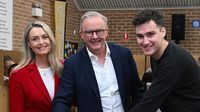In a historic turn of events, Anthony Albanese has secured victory in the 2025 federal election, marking the first time in over two decades that an Australian Prime Minister has won a second consecutive three-year term. The election results indicate a significant swing toward the Labor Party, with early projections suggesting they could capture around 90 seats in the 150-member House of Representatives, while the Coalition led by Peter Dutton faces a crushing defeat with only 24 seats.
The Daily Mail Australia was the first major news outlet to call the election result, making the announcement at 7:40 PM on May 3, 2025. Albanese, delivering his victory speech to a jubilant crowd in Sydney, emphasized the importance of Australian values in his government’s approach. “Australians have chosen to face global challenges the Australian way, looking after each other while building for the future,” he stated. “We do not need to beg or borrow or copy from anywhere else. We find it right here in our values and in our people,” he added, in a clear nod to the political climate influenced by U.S. President Donald Trump.
In a dramatic twist, Opposition Leader Peter Dutton not only lost the election but also his own seat of Dickson, which he had held for 24 years. Conceding defeat, Dutton expressed his acceptance of responsibility for the loss, saying, “We didn’t do well enough during this campaign, that much is obvious tonight, and I accept full responsibility for that.” He also congratulated Albanese on his historic victory, acknowledging the significance of the moment for the Labor Party.
As the election unfolded, several other prominent Liberal figures faced significant losses. Liberal frontbencher Michael Sukkar and first-term MP Keith Wolahan are projected to lose their seats in Melbourne, while Bridget Archer, the Liberal MP for Bass in Tasmania, was ousted by Labor’s Jess Teesdale. Additionally, the Greens faced challenges, with Max Chandler-Mather looking set to lose his inner-city Brisbane seat of Griffith to Labor rival Renee Coffey.
The election was marked by a high voter turnout, with nearly half of the 18 million registered voters casting their ballots before election day, a reflection of Australia’s compulsory voting laws. Polling centers, often resembling community fairs, provided voters with the opportunity to enjoy “democracy sausages” while participating in the electoral process.
International leaders have already begun to congratulate Albanese on his victory. UK Prime Minister Keir Starmer expressed his delight, stating, “The UK and Australia are as close as ever – which goes to show that long-distance friendships can be the strongest.” India's Prime Minister Narendra Modi also sent his congratulations, praising Labor's “resounding victory” and noting the enduring faith of the Australian people in Albanese’s leadership. Papua New Guinea’s PM, James Marape, was the first foreign leader to reach out, offering his congratulations shortly after the results were announced.
As the night unfolded, Labor supporters celebrated wildly, especially with the news of Ali France’s victory over Dutton in Dickson. France, who had previously contested the seat twice before, was greeted with cheers and chants from her supporters as she prepared to deliver her victory speech. “I’m so grateful for this opportunity,” she said, highlighting her commitment to serving her community.
In his victory speech, Albanese took a moment to acknowledge the traditional owners of the land, stating, “I acknowledge the traditional owners of the land on which we meet, and I pay my respects to elders past, present, and emerging today – and every day.” He also expressed optimism for Australia’s future, citing the resilience and skills of its people as key to navigating global challenges.
However, the night was not without its challenges. The Coalition faced a potential wipeout in Victoria, with projections indicating that they could end up without a single seat in inner or middle Melbourne. This situation has prompted discussions among Liberal party members about the future leadership of the party, with names like shadow treasurer Angus Taylor and deputy leader Sussan Ley emerging as possible successors to Dutton.
Jane Hume, a prominent Liberal figure, acknowledged the similarities between the Coalition’s defeats in 2025 and 2022, indicating a need for reflection and strategy moving forward. “The first thing I will be doing tomorrow is going through that election review,” she remarked, emphasizing the importance of learning from past experiences.
As the dust settles from the election, many are left wondering about the future of the Liberal Party and the direction it will take under new leadership. Meanwhile, Labor is poised to capitalize on its victory, with Albanese promising to focus on key issues such as housing affordability, healthcare, and climate action in the coming term.
With a clear mandate from the electorate, Albanese is set to lead a government that reflects the diverse values and aspirations of the Australian people. As he concluded his speech, he reiterated the commitment of his government to serve all Australians, stating, “Tomorrow, we dedicate ourselves to your service. We renew the great responsibility and the opportunity of government.”





